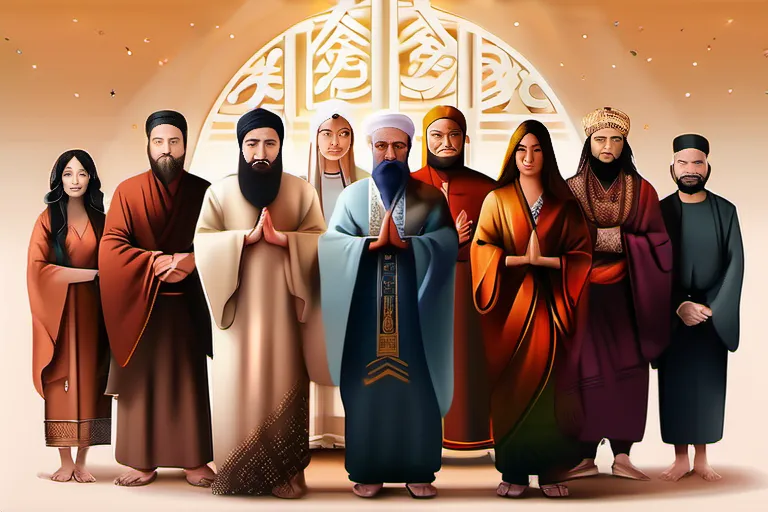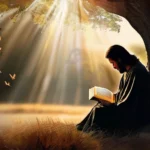Exploring the nuances between non-religious worldviews and religious beliefs
In today’s diverse world, it is essential to understand the differences between those who identify as having no religion and those who hold other beliefs. This article delves into the unique aspects of each perspective, providing valuable insights for all readers.
The Definition and Scope of No Religion
Have you ever pondered why someone might choose to identify as ‘no religion’? It’s not just about not going to church or synagogue; it’s a complex decision involving personal beliefs, cultural influences, and societal pressures. So, what exactly does ‘no religion’ mean in today’s world?
The term “no religion” encompasses a wide spectrum of individuals who do not adhere to any organized religious system but may still hold spiritual or philosophical views. These people might believe in something greater than themselves, such as the universe or human potential, without being part of an established faith.
- Imagine walking through a vast forest and realizing that you don’t belong to any specific tribe; yet, you still find beauty and meaning in the trees and streams around you. That’s somewhat like identifying as no religion—it’s about finding personal truth outside traditional religious structures.
According to various studies, the percentage of people who identify as non-religious is on the rise globally. But why do they choose this path? Some might find organized religions too restrictive or dogmatic, others prefer a more personal approach to spirituality. Could it be that these individuals are simply seeking their own path in life?
Consider also the influence of cultural and societal factors. In some societies, religious identity is deeply intertwined with national identity, making non-religiousness a bold statement. For others, it might just feel like a personal choice, one they’ve made after much reflection.
The key here lies in understanding that ‘no religion’ is not a monolithic concept. It can range from individuals who actively reject all forms of organized belief to those who simply prefer not to be labeled by any particular religious system. Each person’s journey and reasons for this identity are as unique as their fingerprints.
As we explore the diverse landscape of beliefs, it’s crucial to recognize that just because someone doesn’t belong to a traditional religion doesn’t mean they lack belief or search for meaning in their lives. Understanding these nuanced perspectives is vital in our ever-evolving world.
Understanding Other Beliefs: A Brief Overview
When we talk about other beliefs, we’re delving into a vast and complex landscape of human thought and spirituality. From the ancient wisdom of Hinduism to the monotheistic religions of Christianity, Judaism, and Islam, each belief system carries its own unique framework for understanding the world and one’s place within it.
Let’s consider Hinduism, often referred to as a way of life rather than just a religion. Its intricate tapestry includes numerous gods and goddesses, reincarnation, karma, and dharma (duty). How does the cycle of rebirth in Hinduism compare to the concept of eternal life or resurrection in Christianity? Can one truly understand the depth of Hindu philosophy without experiencing its practices?
Moving on to Judaism, we encounter a belief system rooted deeply in history and tradition. Its core values of justice, compassion, and ethical living are woven into daily life and ritual. How do these principles differ from the moral teachings found in other religions? What role does law play in Judaism compared to its influence in secular societies?
Islam, with its strict adherence to Sharia law and the Five Pillars, offers a structured path for Muslims worldwide. How does this framework of duties and obligations compare to the more individualistic approaches found in some non-religious worldviews? And what about the concept of Jihad, often misunderstood as warfare but actually referring to striving towards righteousness?
In contrast, Buddhism emphasizes meditation, mindfulness, and the Four Noble Truths. It aims at alleviating suffering through understanding the nature of existence and letting go of attachments. How does this approach differ from seeking ultimate salvation in other religions? Can secular practices like yoga and mindfulness be seen as spiritual paths within their own right?
Lastly, let’s consider Sikhism, which combines elements of Hinduism and Islam with a unique focus on equality, service, and the worship of one God. How does this blend set it apart from its parent religions? What role do the Guru Granth Sahib and community services play in shaping Sikh identity?
Each of these belief systems offers a lens through which to view the world and our place within it. By exploring their nuances, we gain a richer understanding of human diversity and the intricate web of beliefs that shape our societies.
The Historical Evolution of Religion and No Religion
The historical evolution of religion and no religion has been a winding path marked by pivotal moments that have shaped our understanding of the world. Imagine, if you will, two parallel rivers flowing through human history; one representing religious beliefs, the other representing those who identify as having no religion. Both have their own currents and tributaries, yet they often meet in unexpected places.
Let’s trace back to ancient times when religion was deeply intertwined with everyday life. It provided explanations for natural phenomena, moral guidance, and social cohesion. Think of it as the backbone of societies, holding them together like a sturdy pillar against the winds of change. But what about those who saw no need for this framework? The early No Religion perspective was often dismissed or marginalized, seen as a void in a world teeming with deities and sacred texts.
The rise of Renaissance humanism in the 14th to 17th centuries began to challenge the authority of organized religion. Think of it as a strong current that started carving new paths through the river of belief. Humanists like Niccolò Machiavelli and Rene Descartes emphasized reason and individualism, questioning traditional religious doctrines. This period marked a significant turning point where personal experience and logic began to compete with dogma.
The Enlightenment in the 18th century further accelerated this shift. Think of it as a powerful flood that swept away much of what had come before. Philosophers like Voltaire and Jean-Jacques Rousseau advocated for reason, scientific inquiry, and individual freedom from religious constraints. This period solidified the No Religion perspective as a legitimate worldview, alongside various religious traditions.
The 19th century saw the rise of secularism with figures like Freud, who explored human behavior beyond religious explanations. Meanwhile, the growth of scientific understanding challenged many religious beliefs, making them seem outdated to some. It’s as if the river of religion was flowing ever so slowly, while the river of no religion began to gain momentum.
In more recent times, the rise of the Internet and social media has provided platforms for the No Religion perspective to spread rapidly. The rapid exchange of ideas has made it easier for people to find communities that share their views, creating a vibrant subculture within the broader society. This modern context emphasizes personal freedom and individual choice in belief systems.
As we look at these historical developments, it’s clear that both religion and no religion have evolved significantly over time. They are not static entities but dynamic forces shaped by cultural, social, and intellectual currents. Understanding their evolution is crucial for grasping the complexities of human belief today.
Core Beliefs and Practices: A Comparative Analysis
Imagine walking through a bustling city square, where on one side stands a grand cathedral, its towering spires reaching towards the heavens, and on the other, a quiet, modern-looking center dedicated to humanist values. Each place represents a different way of understanding existence: one rooted in centuries-old traditions, the other in contemporary beliefs. The core beliefs and practices of these two worlds—religious groups versus those who identify as having no religion—are as distinct as night and day.
For religious individuals, their core beliefs often revolve around faith in a higher power or deity, guiding every aspect of life from personal morals to societal norms. They may attend regular worship services, observe sacred traditions, and engage in rituals that strengthen their spiritual connection. These practices are deeply intertwined with their identity and offer a sense of community and belonging.
On the other hand, those who identify as having no religion often base their beliefs on secular or humanist principles. They may focus more on empirical evidence, rational thinking, and ethical behavior guided by reason rather than divine commandments. While they might still value community, it is typically built around shared values and humanistic ideals rather than religious doctrine.
It’s fascinating to ponder how these differing belief systems impact daily life. For a non-religious individual, finding purpose may come from personal growth or societal contributions, whereas for someone deeply religious, purpose could be found in devotion and service to their faith community. Both paths are valid, yet they offer very different perspectives on what it means to live a fulfilling life.
Understanding these core differences is crucial because they shape not only individual lives but also the societies we build. The way people navigate the world, make decisions, and interact with others can vary greatly depending on whether their beliefs are rooted in religious tradition or modern humanism. This exploration into core beliefs and practices highlights how diverse our approaches to understanding ourselves and our place in the universe can be.
The Role of Community and Social Interaction
Imagine walking into two different neighborhoods, one filled with vibrant religious communities and another where people identify as non-religious. How does it feel to be part of each? In No Religion vs Other Beliefs, we explore how community and social interaction shape individuals differently based on their beliefs.
In a neighborhood dominated by religious beliefs, you might find yourself surrounded by rituals, festivals, and communal prayers that strengthen bonds among members. But what about those who identify as non-religious? Do they miss out on these shared experiences? Not necessarily. Non-religious communities often find their own ways to foster unity and support through secular events like community service projects or local meetups.
Consider the metaphor of a garden. Just as different flowers bloom in diverse environments, individuals who follow religious beliefs might thrive in a community rich with traditions and rituals. But don’t non-religious people need nourishment too? They find their own soil to grow, perhaps through intellectual discussions or shared hobbies that bring them together.
The key difference lies not in the lack of religion but in the type of social interaction desired. For those who embrace religious communities, these environments provide a sense of belonging and purpose grounded in faith. Meanwhile, non-religious individuals might seek meaning and connection in different ways—through personal growth, environmental activism, or even volunteer work at secular organizations.
So, how do we navigate this diverse landscape? By recognizing that both religious and non-religious communities offer unique paths to fulfillment and support. It’s about understanding that while one might find comfort in the structured rituals of a faith community, another might find solace in the open discussions within a secular setting.
Ultimately, whether you identify as religious or not, the core aspect is your quest for belonging and purpose. The communities you choose to belong to reflect your personal journey—whether it’s through the rich tapestry of religious traditions or the diverse hues of non-religious practices.
Navigating Life’s Big Questions: Philosophical Perspectives
Imagine life’s big questions as a vast, uncharted ocean. For those who identify as non-religious, they navigate this sea through philosophical lenses and personal beliefs. How do their approaches differ from those with other religious beliefs? Let’s dive in.
Morality is one of the first questions that arises on this journey. In many religions, moral guidelines are derived from sacred texts or divine commands. For non-religious individuals, morality often stems from a combination of ethical theories and personal experiences. They may ask: How do we determine right from wrong without a deity’s instruction?
The concept of purpose can also vary significantly. In religious contexts, one’s life is often seen as part of a larger plan set by a higher power. For non-religious individuals, finding personal meaning and purpose might be tied to their goals, relationships, and contributions to society. They ponder: What gives my life significance if it’s not predestined?
The meaning of existence is another profound question that both groups tackle, but with distinct methods. Religious believers might find answers in the notion of an eternal soul or a divine creator. Non-religious thinkers may seek fulfillment through knowledge, art, or human connection. They might wonder: Is life just about the here and now, or does it have deeper layers?
The paths chosen by non-religious individuals can be seen as more individualized explorations. Their journeys often involve critical thinking and a willingness to question norms and traditions. Conversely, religious believers might find comfort in communal practices and shared beliefs that provide structure and meaning.
Both approaches offer unique insights into the human condition. While one relies on community and tradition, the other emphasizes personal autonomy and introspection. The key difference lies in how they seek answers to life’s biggest questions—through collective wisdom or individual exploration.
Conclusion
 By examining the key distinctions between no religion and other beliefs, we can foster greater understanding and respect among individuals from various backgrounds.
By examining the key distinctions between no religion and other beliefs, we can foster greater understanding and respect among individuals from various backgrounds.











